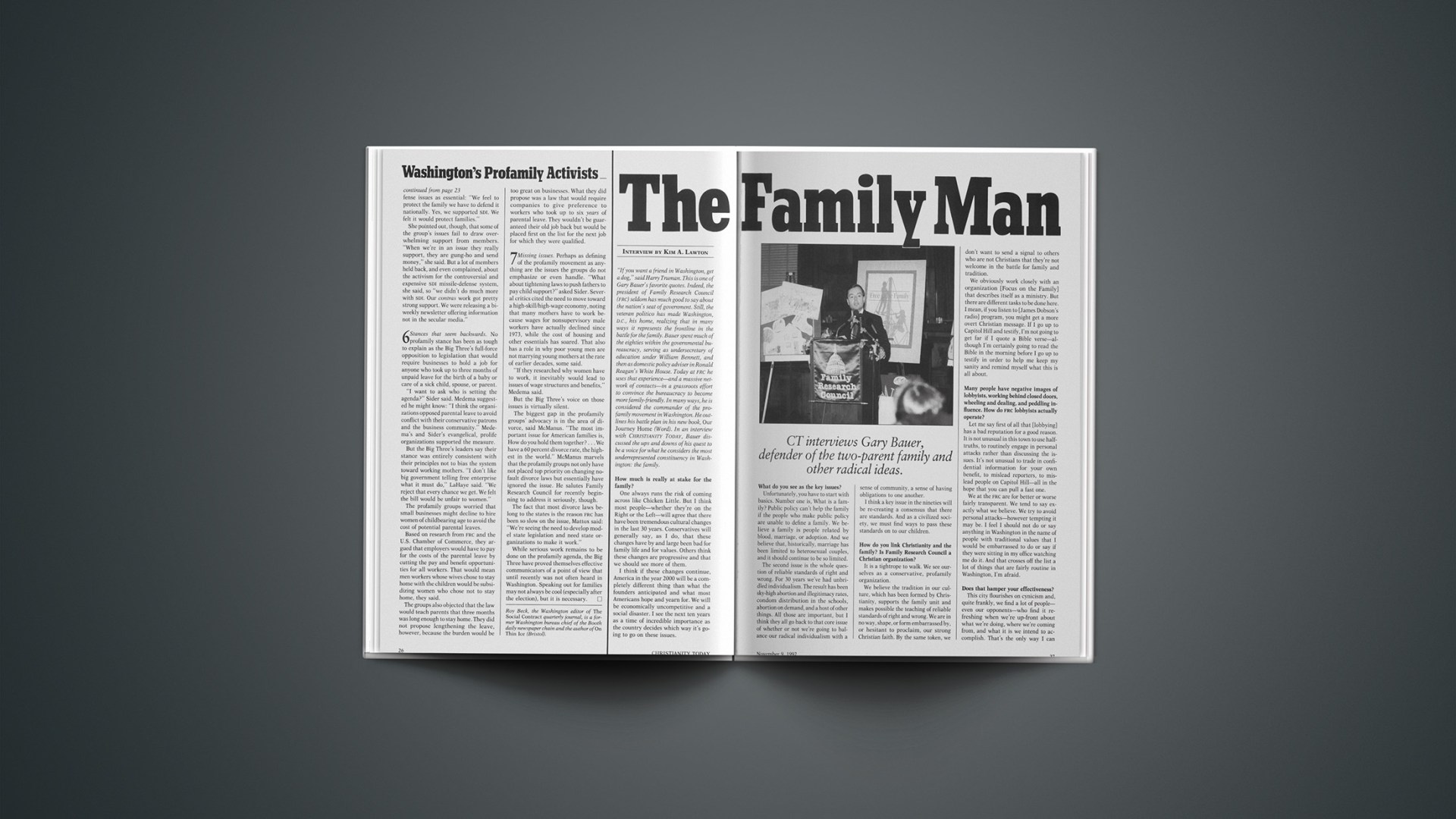CT interviews Gary Bauer, defender of the two-parent family and other radical ideas.
“If you want a friend in Washington, get a dog,” said Harry Truman. This is one of Gary Bauer’s favorite quotes. Indeed, the president of Family Research Council (FRC) seldom has much good to say about the nation’s seat of government. Still, the veteran politico has made Washington, D.C., his home, realizing that in many ways it represents the frontline in the battle for the family. Bauer spent much of the eighties within the governmental bureaucracy, serving as undersecretary of education under William Bennett, and then as domestic policy adviser in Ronald Reagan’s White House. Today at FRC he uses that experience—and a massive network of contacts—in a grassroots effort to convince the bureaucracy to become more family-friendly. In many ways, he is considered the commander of the profamily movement in Washington. He outlines his battle plan in his new book, Our Journey Home (Word). In an interview with CHRISTIANITYTODAY, Bauer discussed the ups and downs of his quest to be a voice for what he considers the most underrepresented constituency in Washington: the family.
How much is really at stake for the family?
One always runs the risk of coming across like Chicken Little. But I think most people—whether they’re on the Right or the Left—will agree that there have been tremendous cultural changes in the last 30 years. Conservatives will generally say, as I do, that these changes have by and large been bad for family life and for values. Others think these changes are progressive and that we should see more of them.
I think if these changes continue, America in the year 2000 will be a completely different thing than what the founders anticipated and what most Americans hope and yearn for. We will be economically uncompetitive and a social disaster. I see the next ten years as a time of incredible importance as the country decides which way it’s going to go on these issues.
What do you see as the key issues?
Unfortunately, you have to start with basics. Number one is, What is a family? Public policy can’t help the family if the people who make public policy are unable to define a family. We believe a family is people related by blood, marriage, or adoption. And we believe that, historically, marriage has been limited to heterosexual couples, and it should continue to be so limited.
The second issue is the whole question of reliable standards of right and wrong. For 30 years we’ve had unbridled individualism. The result has been sky-high abortion and illegitimacy rates, condom distribution in the schools, abortion on demand, and a host of other things. All those are important, but I think they all go back to that core issue of whether or not we’re going to balance our radical individualism with a sense of community, a sense of having obligations to one another.
I think a key issue in the nineties will be re-creating a consensus that there are standards. And as a civilized society, we must find ways to pass these standards on to our children.
How do you link Christianity and the family? Is Family Research Council a Christian organization?
It is a tightrope to walk. We see ourselves as a conservative, profamily organization.
We believe the tradition in our culture, which has been formed by Christianity, supports the family unit and makes possible the teaching of reliable standards of right and wrong. We are in no way, shape, or form embarrassed by, or hesitant to proclaim, our strong Christian faith. By the same token, we don’t want to send a signal to others who are not Christians that they’re not welcome in the battle for family and tradition.
We obviously work closely with an organization [Focus on the Family] that describes itself as a ministry. But there are different tasks to be done here. I mean, if you listen to [James Dobson’s radio] program, you might get a more overt Christian message. If I go up to Capitol Hill and testify, I’m not going to get far if I quote a Bible verse—although I’m certainly going to read the Bible in the morning before I go up to testify in order to help me keep my sanity and remind myself what this is all about.
Many people have negative images of lobbyists, working behind closed doors, wheeling and dealing, and peddling influence. How do FRC lobbyists actually operate?
Let me say first of all that [lobbying] has a bad reputation for a good reason. It is not unusual in this town to use half-truths, to routinely engage in personal attacks rather than discussing the issues. It’s not unusual to trade in confidential information for your own benefit, to mislead reporters, to mislead people on Capitol Hill—all in the hope that you can pull a fast one.
We at the FRC are for better or worse fairly transparent. We tend to say exactly what we believe. We try to avoid personal attacks—however tempting it may be. I feel I should not do or say anything in Washington in the name of people with traditional values that I would be embarrassed to do or say if they were sitting in my office watching me do it. And that crosses off the list a lot of things that are fairly routine in Washington, I’m afraid.
Does that hamper your effectiveness?
This city flourishes on cynicism and, quite frankly, we find a lot of people—even our opponents—who find it refreshing when we’re up-front about what we’re doing, where we’re coming from, and what it is we intend to accomplish. That’s the only way I can explain the fact that, in spite of being an outspoken conservative, I am invited by liberal politicians to come up and testify. It’s not that I let them off easy; generally in those hearings there are fairly heated exchanges. But I think they feel they’re not going to get a sucker punch. And that’s heartening.
What do you consider the profamily movement’s key areas of effectiveness?
I think the greatest compliment that could be paid to the efforts of the movement is to rewatch a videotape of the Democratic Convention. The platform of that party still has major problems, in my view, but what’s clear is that almost every major politician in the country believes that the American people are hungry for affirmation of the values of hearth and home. I don’t believe that would have happened if over the last three or four years groups like ours had not been constantly sounding that theme and demanding that elected officials address it. And if the Democrats say these things often enough, they may actually begin to believe them, and that would be even better.
What are your biggest obstacles?
Even though we’re bringing in enough money to do what we planned to do, most of the groups in this movement are terribly underfunded compared to our competitors. Groups like the Children’s Defense Fund, the American Civil Liberties Union, and Planned Parenthood outclass us, often with Hollywood money and very large contributions. It would be nice to do this battle for a couple of years and not have to worry about the bottom line.
You’ve been personally active in Republican politics. Is there a danger that FRC may be seen as pro-Republican rather than profamily?
There is always that danger. I have not had a problem with that, because over the last couple of years I’ve been critical of the Bush administration when they’ve done something that we think was inappropriate. To the extent I get complaints, it tends to be from people who say, “Gary, I agreed with what you said, but we don’t want to hurt President Bush.” And I remind them that we are not an annex of the Republican National Committee.
We are willing to work with anyone who will embrace the profamily philosophy we have. We were in the process of briefing Ross Perot on some issues when he unceremoniously left the race. And I requested to testify before the Democratic platform committee. Not surprisingly, just as they didn’t let Governor Casey [a prolife Democrat] testify, they certainly didn’t let me, either. But we will continue to aggressively defend these values, even when that means criticizing people that I may feel a political affinity for.
Some people contend that the profamily agenda is too broad, incorporating issues that are more concerned about conservative ideology than the family. FRC literature mentions things like the banking scandals or the balanced budget amendment. How narrow an agenda should there be in determining when something is profamily?
I think the profamily movement has made a mistake in defining the agenda so narrowly that it means only abortion, pornography, and gay rights. It’s also very antifamily to be going into debt by billions of dollars, which will have to be paid back by our children. You can’t convince the American people there are reliable standards of right and wrong if their leaders in Washington are routinely abusing their privileges and the institutions that they’re in control of. So I do see those things as part of the family agenda.
You’re not going to see us taking positions on the Strategic Defense Initiative, on Yugoslavia, or whether we should be hitting Iraq or not. But there are other things that do have a clear family angle to them, and we shouldn’t be afraid of them.
You have criticized government programs as being bad for the family. Is government spending in and of itself antifamily?
It depends on the way the spending is done. More often than not, if that government spending is part of a Washington-based program with a Washington-based bureaucracy, it ends up being bad for the family. The programs end up reflecting the values of those bureaucrats instead of the values of the people they’re trying to help. If what Washington does empowers families through educational vouchers, tax relief, or other things that put more money into the pockets of the American people, then that’s profamily.
What about those families that have fallen through the cracks and are in a real crisis situation? What’s the government’s responsibility there?
In a caring and decent society, there will always be a safety net. The challenge for us is to provide that help without providing incentives for the behavior that causes people to be in those predicaments. I think the evidence is fairly overwhelming that we have constructed a welfare system that has made it easier for people to make bad decisions. I suspect that the challenge of the nineties is going to be whether the best minds on the Right and the Left can come up with ways to help the poor without making it more likely that we’re going to have more poor.
Is there a specific role in the profamily movement for churches and religious leaders?
America desperately needs to rediscover the obvious. In 30 years we have forgotten a lot of very simple things: how to find happiness, how to have a good life, arid how best to raise children. It is among church people generally that the obvious is most understood. So I think it’s up to church people to carry the torch, to remind Americans that there are rules, and these rules actually work. I would like to see a self-assured Christianity in this country, a Christianity that acts as if it has the answers, because, in fact, it does. If there’s ever a time for the church to be looking home, it seems to me that this is the time. The Brazilian rain forest may desperately be in need of help, but the inner cities of America are even more desperate. I would just hope that we can devote as many resources as possible to helping this country find its moorings again.










